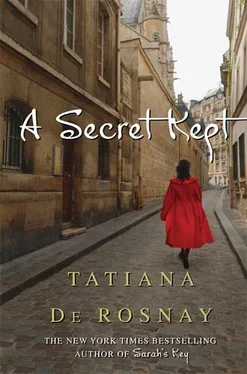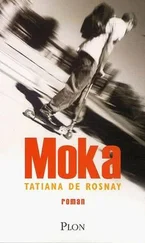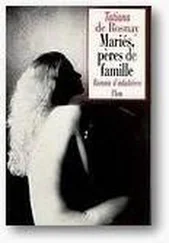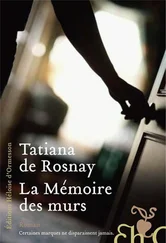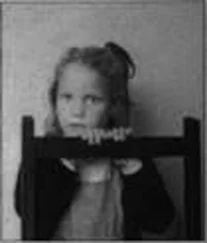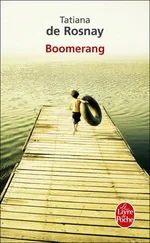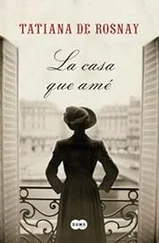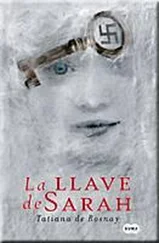“I’m fine. And you?” I whisper back.
“Can’t move. This thing scratches like hell.”
Fleetingly I wonder if she really is okay, if she really will be able to move one day, if Dr. Besson has told the entire truth.
“Does it hurt?” I ask.
She shakes her head. “I feel strange.” Her voice is slow, weak. “Like I don’t know who I am anymore.”
I caress her hand.
“Antoine,” she says. “Where are we?”
“In a town called Le Loroux-Bottereau. We had an accident on the highway after we left Nantes.”
“An accident?”
I realize she doesn’t remember anything at all.
I decide not to remind her. Not for the moment. I tell her I don’t remember either. She seems pacified by this and squeezes my hand back.
Then I say, “He’s coming.”
She knows who I mean. She sighs and turns her head, and I watch as her lashes flutter down against her pale cheek. I go on looking at her. I feel like her guardian angel. I haven’t watched a woman sleep since Astrid. I used to watch Astrid for hours. I’d never tire of gazing at her peaceful face, the quiver of her lips, the mother-of-pearl eyelids, and the slow heave of her bosom. In her sleep she seemed fragile and young, like Margaux now. I haven’t watched Astrid sleep since our last summer together, a year ago.
The summer our marriage broke up, Astrid and I rented a square white house on the Greek island of Naxos. We had already decided to separate in June (or rather, Astrid had decided to leave me for Serge), but it was impossible to cancel the rental or the airline and boat tickets at such short notice. So we went ahead with the ordeal of our last summer as an official married couple. We hadn’t told the children anything yet, and we tried to be their normal, everyday parents. We ended up acting so falsely enthusiastic that the children guessed something was amiss. Astrid spent most of her time reading on the sun deck in the nude. She developed a chocolaty tan that made me sick because I knew Serge would soon run his hamlike hands along it, not I.
For the entire three weeks of our grueling stay I felt like putting a bullet through my head. I would sit on the lower terrace overlooking Orkos and Plaka, chain-smoking between steady swipes of lukewarm ouzo. The view was stupendous, and I would admire it through a drunken haze of acute unhappiness. The brown, rounded island of Paros seemed a mere swim away, the sea shimmering ultramarine, dotted with foamy white specks caused by overpowering wind. When I got too desperate or too drunk, or both, I’d stagger down the steep, dusty path to the creek and fling myself into the water. A jellyfish once stung me, but I was so distraught I hardly felt it. Later, Arno had pointed at my chest, and looking down, I had discovered an angry red welt, as if someone had taken a whip to my skin.
The summer of hell. To add to my mental discomfort, the serenity of the early mornings was shattered by the grating sound of bulldozers and drills from higher up on the hill where an overambitious Italian was building a villa that looked like a set for a James Bond movie. Incessant lumbering trucks laden with dug-up earth toiled up and down the little path that passed right in front of our house. Impervious, I sprawled on the terrace, black exhaust fumes billowing in my face. The drivers were friendly, waving to me each time they shuddered past, their monstrous engines a couple of yards from my untouched breakfast.
To top it all, tank water was scarce, the electricity failed us each evening, the mosquitoes were bloodthirsty, and Arno broke the high-tech suspended marble toilet simply by sitting on it. Every night I’d share the bed with my soon to be ex-wife, watch her sleep, and silently cry. She had murmured again and again, like a patient mother with a reluctant child, Antoine, I just don’t love you the way I used to, taking me into her arms with maternal gusto while I still shivered with desire at her touch. How is that possible? How can that happen? How can a man ever get over that?
I had introduced Astrid to Mélanie eighteen years ago. Astrid happened to be a junior publicist for a rival publishing company. They soon became good friends. I remember the interesting contrast they made: small, delicate, dark-haired Mélanie, and Astrid, with her fair hair, pale blue eyes. Astrid’s mother, Bibi, is Swedish, from Uppsala, laid-back, artistic, and definitely odd. But charming. Astrid’s father, Jean-Luc, is a famed nutritionist, one of those tanned, sickeningly fit men who make you feel like a cholesterol-riddled slob. Obsessed with regular bowel movements, he sprinkles bran over everything Bibi cooks.
Thinking of Astrid makes me want to call her and tell her what happened. I tiptoe out of the room. Her phone rings and rings. She doesn’t pick up. The paranoia in me suggests that I should prevent my number from flashing on her screen so that she won’t know who called. I leave her a short message. Nine o’clock. She is probably in her car right now, our old Audi. I know her schedule by heart. She has already dropped Lucas off at the local school, and Arno and Margaux at Port-Royal where their lycée is, and she is fighting morning traffic to get to Saint-Germain-des-Prés, to her office on the rue Bonaparte, across from Saint-Sulpice church. She is putting on her makeup at red lights, and men look at her from the next car and think, Pretty woman. Then I remember it’s mid-August. She’s still on vacation. With him. They are probably back in Malakoff with the children. They drove up from Dordogne this weekend.
When I turn back to Mélanie’s room, there is an old man with a paunch standing in front of her door. I need a couple of seconds to understand who he is.
He takes me into his arms roughly. I am always startled by my father’s abrupt hugs. I never hug my son like that. Arno is at an age where he loathes being hugged, so when I do hug him, I do it gently.
He steps back and squints up at me. Brown eyes protruding, full red lips, thinner now, turned down. His vein-ridden hands seem fragile, his shoulders droop. Yes, my father is an old man. This is something of a shock. Do our own parents see us getting older as well? Mélanie and I are no longer young, even if we are still his children. I recall one of our father’s carefully nipped and tucked lady friends, Janine, saying to Mélanie and me, “It’s so strange seeing your friends’ children becoming middle-aged.” And Mélanie had replied with a smooth smile, “It is even stranger seeing your parents’ friends becoming old ladies.”
My father may look decrepit, but he has not yet lost his spirit.
“Where the devil is the doctor?” he growls. “What the hell is going on? This is a useless hospital.”
I say nothing. I am used to his outbursts. They don’t impress me anymore. A young nurse scurries by like a frightened rabbit.
“Have you seen Mel?” I ask.
He shrugs. “She’s asleep,” he grunts.
“She’s going to pull through,” I say.
He glares at me, infuriated.
“I’m having her transferred to Paris. There is no point keeping her here. She needs the best doctors.”
I think of Bénédicte Besson’s patient hazel eyes, of the bloodstains on the front of her uniform, of what she did last night to save my sister’s life. My father sits down heavily on a nearby chair. He looks at me, expecting an answer or a reaction. I give him neither.
“Tell me again what happened.”
I do so.
“Had she been drinking?”
“No.”
“How can you just drive off the highway?”
“That’s what happened.”
“Where’s your car?”
“It’s more or less wrecked.”
He observes me, sullen, dubious.
“Why were you two in Noirmoutier?”
“It was a surprise for Mel’s birthday.”
Читать дальше
